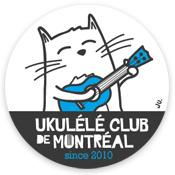
Recently, my awesome gfriend signed us up to a beginner's ukelele course given by the Montreal Ukelele Club at UQAM. She's been listening to me talking about ukeleles for a while now but rather than just get me to sign up for the course by myself, she tagged along so that it would be a fun duo experience that we could both get into.
Given my lack of any know-how when it comes to playing music, I had serious misgivings but it was actually a sweet 2 hour spent with one of their members, Ju, with an infectious love and enthusiasm for the ukelele. It was tough and hard and I still struggle with the finger placement but all in all it made both of us want to keep with it so we went to Archambault the next day and got two ukes to practice on. And now we're trying to learn Bob Dylan's Mr Tambourine Man which man, is harder than you think it'd be.
My gfriend finds practicing the ukelele to be an almost meditative experience - a moment during which she doesn't need to think about anything else except for finger and body placement and progressively getting better at moving from chord to chord. Me, on the other hand, am frequently finding it to be challenging and I'm not yet deriving any pleasure from practicing by myself and more often than not feel my internal tension build up as I struggle through it. So I rarely do. The only time I really enjoy it, is when we practice together. Which we need to really since learning a stringed instrument has a fairly steep learning curve - involving several different steps related to technique: proper finger placement on individual strings AND on chords, moving through chord progression, proper strumming and building comfort at playing a particular song before what you're doing remotely begins to sound like what you're aiming to do. As such, this has been a very different experience from say drawing and painting where I can get immediate pleasure
Nevertheless though, the whole thing's making us think pretty hard about differences in learning styles. The Student Development Center at University of Western Ontario identifies three: auditory (someone tells you how), visual (you see it being done) or kinesthetic (lhands-on) But I think there's a need for a lot more and to expand on what looks to be a linear axis related to stimuli by adding another one related to the learning experience's social component - and that looks at the social context surrounding the learning experience.
Not everyone learns the same... My gfriend and I are a good example of this. When we cook, she follows recipes to the letter but gains confidence and skills and acquires wonderful recipes as a result whereas I can more or less work my way confidently enough around making food - tossing it together and improvising, but nevertheless expanding my repertoire much more slowly than she does.
At the moment, I'm knee-deep in community-of-practice theory by Jean Lave and Etienne Wenger and it's getting me to appreciate the extent to which I rely on the social aspect of the experience - that it needs to be part-and-parcel of the learning cause otherwise I get bored and tune out.
And though my gfriend and I are not a community of practice per-say, our co-learning experience in ukelele shares aspect of what Lave and Wenger would define as such. For one, we're in the process of developing a shared language related to our experience of the ukelele - a language that's specific to chords and finger placement and instrument positioning and which songs we like the most and want to practice. There are clear definitions to our community - we do it together - and these boundaries are what makes the learning fun and special to us. It's a learning practice that's specifically geared towards one particular thing: learning the ukelele and we know how and when we'll be successful. And while it's a community with specific boundaries, it's nevertheless situated within a broader social framework of other communities of practice and includes: a broader body of music we like, the Montreal Ukelele Club, friends of ours who are in bands... Most importantly though, it's a community that's largely informal and non-hierarchic.